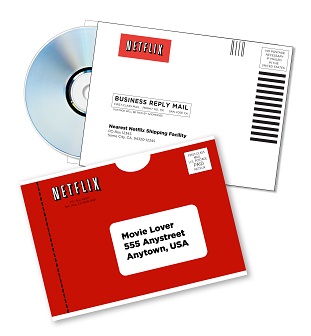Court: USPS Giving Netflix DVDs Unfair Treatment
The smarter way to stay on top of the multichannel video marketplace. Sign up below.
You are now subscribed
Your newsletter sign-up was successful

The U.S. Postal Service is improperly giving Netflix’s DVD mailers preferential treatment, a federal appeals court ruled Friday in granting a review requested by videogame DVD rental service GameFly.
Netflix has been trying to migrate customers to its Internet streaming service, which costs far less per title than DVD mailers. The company at one point said it mailed upwards of 2 million DVDs per day.
GameFly filed a discrimination complaint with the Postal Regulatory Commission in April 2009, requesting the same procedures the USPS provides to Netflix free of charge. The Postal Service diverts Netflix mailers from the automated letter stream, shifting it to specially designated trays and containers and hand processing it.
In response to the GameFly complaint, the Postal Regulatory Commission -- instead of extending the game service the same handling it provides Netflix -- ordered the USPS to waive a 20-cent second-ounce charge of DVDs mailed as “flats” as well as to refrain from imposing a surcharge on DVD mailers sent as letters under an ounce (which require manual sorting to avoid damaging DVDs).
A three-judge panel of the U.S. Court of Appeals for the District of Columbia Circuit ruled that the Postal Regulatory Commission’s decision was “arbitrary and capricious.” The court vacated the commission’s order and remanded it for further proceedings.
The commission’s order “left much of the discrimination in place,” Chief Judge David Sentelle wrote in the decision. “The price granted by the remedy is not as low as the alternative remedy sought by GameFly, and even at this rate, GameFly mail may continue to generate more than double the contribution per piece than Netflix mail.”
GameFly is forced to use flats to ship its DVDs and therefore pay more than Netflix, because the USPS will not extend to GameFly the same special handling for DVDs sent as letters to prevent damage, Sentelle said.
The smarter way to stay on top of the multichannel video marketplace. Sign up below.
“The Commission cannot justify the terms of service discrimination its remedy leaves in place (providing manual letter processing to Netflix but not to GameFly) based on the companies’ use of different mailers when the use of different mailers is itself the product of the service discrimination,” the judge wrote.
Asked for comment, a USPS representative said it is in the process of analyzing the GameFly decision.
"The matter has been remanded to the Postal Regulatory Commission and the Postal Service will be prepared for subsequent legal proceedings in that forum," USPS said in a statement. "However, as we stated in the earlier proceeding before the Postal Regulatory Commission, the Postal Service believes that the different treatment that we provided to our customers was fully justified and reasonable, and consistent with the law."
Netflix declined to comment on the case. The company is not a party in the case, though it is central to GamePlay's complaint.
The workarounds GameFly must use to mail DVDs so they won't get damaged by automated sorting equipment are expensive, Judge Sentelle noted: The Postal Service charges $0.44 for a DVD mailer entered as a one-ounce First-Class letter, but $0.88 for the same piece entered as a one-ounce First-Class flat. Moreover, GameFly must use a protective cardboard insert, which adds another ounce so it must pay the second-ounce charge of $0.20 per piece as well.
The judge also wrote that, “While the record is not totally clear, it appears that a third company, Blockbuster, Inc., may have benefitted from some of the same favorable treatment allegedly extended to Netflix.”
A copy of the nine-page decision is available here.
As of the end of September 2012, Netflix had 8.47 million DVD-by-mail customers, down 39% from 13.81 million a year earlier. U.S. paid streaming subscribers increased 18% to 23.8 million, up from 20.15 million a year prior.
For the first nine months of 2012, Netflix said its content delivery expenses (including DVD postage and Internet content delivery networks) decreased $136.1 million, primarily due to a 43% decrease in the number of DVDs mailed for paid subscriptions.
